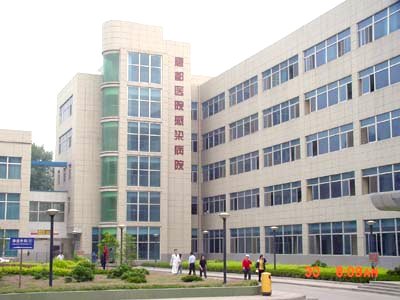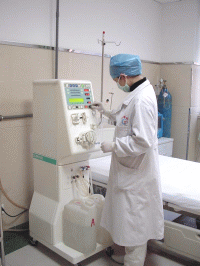
The Formation and Development of Department of the Infectious Diseases at Tangdu Hospital Affiliated with the Fourth Military Medical University
The Fourth Military Medical University's Infectious Diseases (ID) Department was established in 1949. In 1969 the Second Affiliated Hospital, now called Tangdu hospital, opened another ID department. Starting in 1978 a master's degree in ID was first offered, and then in 1986 the University became the first military hospital to offer an infectious diseases doctorate. Finally, in 1995 the University developed a post-doctoral program. Furthermore, in 1996 the Xijing Hospital and Tangdu hospital’s ID department merged and expanded the University Hospital’s infectious diseases capacity.
Shaanxi Province recently recognized the University's medical disciplines by giving them the highest ranking possible. The Chang Jiang Scholars Program is offered in our department since 2002. Our department ranks among the top 5 ID departments in the whole country of China.
After more than half a century of development and growth, Our department is one of the largest ID units out of all the general hospitals in China. The ID department has highly trained doctors. Our 15 doctors include the well-known infectious disease experts Professor Zhou Yongxing and Professor Bai Xuefan. The department chairperson is Professor Sun Yongtao. Other members of the department include Vice-chairman Huang Changxing, Professor Jia Zhansheng, and Associate Professor Lian Qijian. Eighty-five percent of the attending infectious diseases physicians hold medical doctorates, including nine physicians returning from studying abroad.
The ID department currently has 8,800 square meters of clinical and laboratory space and 110 beds dedicated to treating infectious diseases. Both Xijing Hospital and Tang Hospital offer ID out-patient services. The inpatient department offers single or double rooms with attached bathrooms and is equipped with an advanced paging system, a concentrated oxygen supply system, and a centralized negative air-flow system. Furthermore, all rooms offer central air-conditioning, telephones and color television sets. Modern 1.1 meter wide hospital beds and 24-hour hot water provide patients a comfortable setting while the diagnosis and treatment of infectious diseases takes place.

Specialized treatment capacities within the department include mechanical ventilation, artificial liver support systems, ascites removal systems, and ultrasonography. Modern laboratory diagnostic capacities include real-time quantitative PCR, flow cytometry and other sophisticated laboratory testing. As the only research center for infections in the region, care of those suffering from hepatitis B and C, hepatic cirrhosis, severe hepatitis, hemorrhagic fever with renal syndrome, and HIV/AIDS is a clinical focus. The treatment of common infectious diseases is also offered. As the highest ranked ID department in the region we, each year, treat more than 3,600 infectious diseases inpatients while the department's outpatient clinic sees nearly 45,000 patients.
Our ID department is committed to all levels of infectious diseases training. In recent years new communicable diseases have challenged us to explore new methods of clinical care and research. Educational reform measures have allowed us to develop a comprehensive program. In post-graduate teaching, attention to quality education has allowed more than 100 graduate students to obtain master's or doctorate ID degrees. In recent years many department members were given special awards including outstanding teacher awards and excellence in clinical teaching awards, and the department was recognized as being the best teaching department in the University.
The highly awarded ID department's core clinical research addresses three current clinical problems: viral hepatitis, HIV/AIDS, and hemorrhagic fever with renal syndrome. International and national-level research grants have been awarded to our department. We currently are using two successively awarded international cooperative research grants. On a national level, we have been awarded the 10th national 5-year planning grants,"973" and "863", which are basic and applied research programs. In addition, we have obtained 20 grants from the National Natural Science Foundation. In national competition, the department has won second prize three times in the area of scientific and technological progress and third place in the area of new inventions; furthermore, from the military and provincial level we have been awarded second prize 14 times in the area of scientific and technological progress. Finally, the department has published more than 20 books about ID topics.
Our ID department is determined to uphold the standard of excellent research, teaching and patient care. We also wish to carry forward the spirit of Norman Bethune by diligently dedicating ourselves to the care of all infected patients, reducing the incidence of infectious diseases and mortality, and making new scientific contributions.
